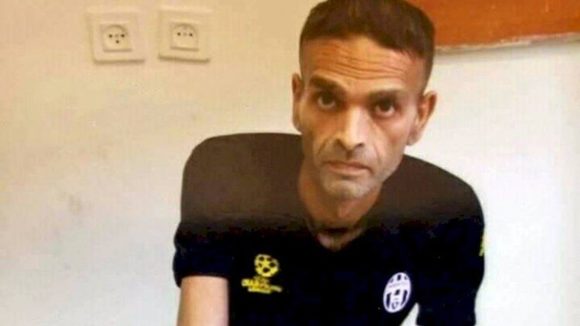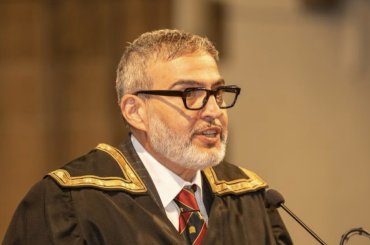The last words of Sami Abu Diak, a Palestinian prisoner in Israel who lost his battle with cancer yesterday morning, was the first thing I woke up to. His last letter, widely circulated on social media, reads:
“To all people of conscience, I live my last days and hours, and I want to spend them with my mother and beloved family. I want to die in my mother’s arms. I don’t want to leave life with my hands and legs handcuffed in front of jailers who love death and delight in our pain and suffering. Will these words find ears by officials? I tell you, if I die away from my mother, I will not forgive you.”
It is too frightening to think that a Palestinian’s wish in an Israeli prison, to die in his mother’s arms was out of reach. All Abu Diak wished for was to have his shackles removed and to be allowed to spend his last days in his mother’s arms, a wish Israel prevented him from realizing when his request for compassionate release was not approved in time (local press reported his next hearing date was Dec. 2), even as he was counting his last days after he was told his battle with cancer would be coming to a tragic end soon.
Abu Diak was 36 years old. He died of cancer and suffered from renal and pulmonary failure. He was from Silat Aldahir village near Jenin. He was convicted of killing three Israelis in 2002 and was sentenced to three life sentences, of which he served 17 years. His brother Samer Abu Diak is also serving a life sentence.
Abu Diyak is not the first Palestinian prisoner to die while incarcerated in Israel. The Palestinian prisoner rights group Addameer noted in a statement, “With Abu Diyak’s death, the number of prisoners who died in prison is (222) prisoners since 1967 including 67 prisoners who died because of medical negligence. Five out of those prisoners died in 2019.”
Morbidly, after a Palestinian prisoner dies, another legal battle can ensue. Sometimes Israel returns the remains to the surviving relatives without delay but increasingly families have to file a lawsuit in order to receive the body. In 2018 Israel passed a law expanding its ability to withhold returning remains of Palestinians killed by the IDF. At times, Palestinian remains are never returned even after seeking out the court system. Palestinian families who have lost lawsuits endure relatives being buried at the “Cemetery of Numbers,” where Israel holds over 200 Palestinian remains in either shallow gravesites in closed military zones marked by a number, or inside freezers at hospital morgues. Common lore is that this is Israel’s way of ensuring a lengthy prison sentence is served in full, even after death.
Today, the situation of Palestinian prisoners is complex on many fronts. While the Palestinian Authority, led by Mahmoud Abbas, said in February that it will not accept tax revenues from Israel as long as the later deducts money allocated by the PA to families of Palestinian prisoners who killed Israelis, it finally reversed its position in early October after months of salary cuts from the loss of revenue. Not only this, this morning a group of Palestinian police in Ramallah cleared a tent sit-in and reportedly assaulted a group of released prisoners who were protesting the PA’s cutting off their salaries.
“Prisoners are what remained of Palestine,” a friend of mine has always told me. Over the years, Palestinian prisoners, who include the best intellectuals of the Palestinian society, journalists, students, activists, women, and children are fighting their battle alone, except for some solidary events. They fight for their basic rights alone, just like recently when they went on a mass-open-ended hunger strike to get landlines installed at their cells so that they could speak to their families three times a week, a victory that was considered historic for the Palestinian national movement in Israeli detention facilities.
Palestinian prisoners do everything alone, they live and dream alone, and they die alone too. Some of them, like Abu Diak, die wishing to be reunited with their families for a few hours on their deathbed, following years of slow death in Israeli prisons. Some of them die from torture, like Arafat Jaradat, and some of them die by bullets well after their release, such as Ayman al-Abbasi who was 17 when he was killed by Israeli police in 2015 during a demonstration in Jerusalem.
It is both tragic and ironic to wish to gain some dignity in death, but when freedom is stolen away and when prisoners spend long years detained, wishing to gain dignity in death is an option, a tragic one. Consider the case of Nael al-Barghouthi, who has spent 40 years in Israeli jails, becoming the longest-serving political prisoner in the world. What choices will he have when freedom is out of reach? Remember, he is imprisoned by a country that just deported Omar Shakir, Human Rights Watch’s Israel and Palestine director.




The “only” democracy in the Middle East showing their “compassionate” and “humane” policies again. How they begged and pleaded for their criminal spy Jonathan Pollard to be released from jail where he was serving a life sentence, for spying for Israel, stating that Pollard was dying and needed to go back to Israel, and the US eventually released him. When it comes to their own criminals, they act with a certain entitlement, and treat others inhumanely.
“jailers who love death and delight in our pain and suffering”
I wish I didn’t believe this, but I do.